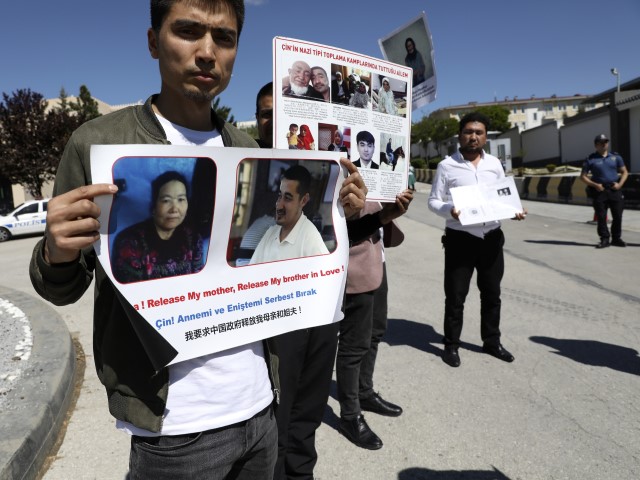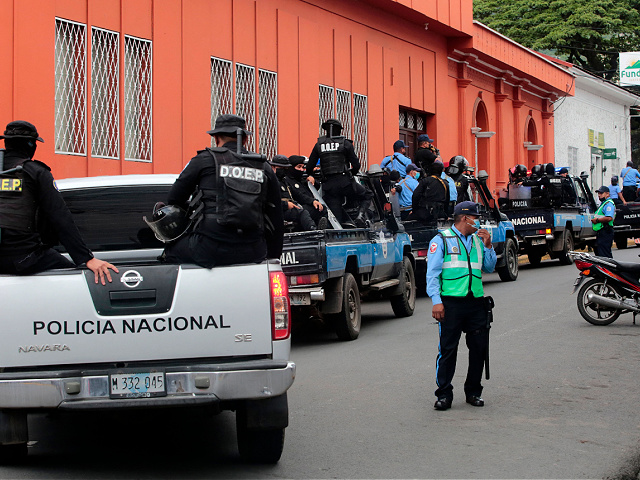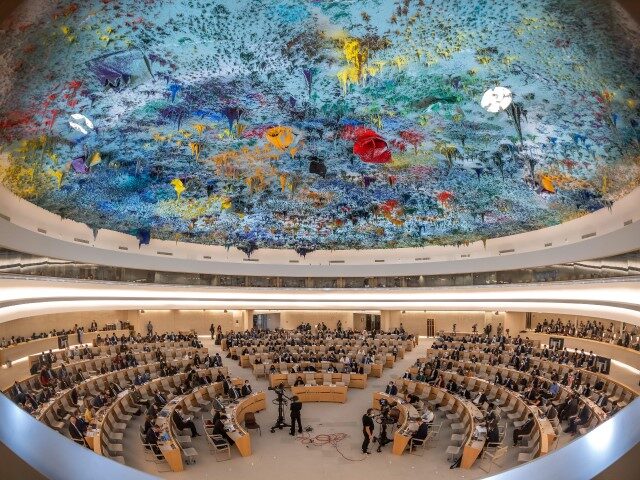The United Nations Human Rights Council began its 51st session on Monday with a new high commissioner and under heavy global scrutiny following the recent publication of a report on the Uyghur genocide in China that notably did not use the word “genocide” to describe Beijing’s campaign in East Turkistan.
Former High Commissioner for Human Rights Michelle Bachelet traveled to East Turkistan – an occupied region (which Beijing refers to as Xinjiang) home to the Uyghur and other non-Han, Muslim-majority ethnic populations – in May, allegedly to explore years of investigations, testimonies, and other evidence suggesting that China was committing genocide there. Bachelet used the occasion to praise China for its “tremendous achievements” in human rights, claim that it had dismantled its concentration camps (which the Communist Party refers to as “vocational education and training centers”), and insist that her presence there was “not an investigation.”
The final report on the situation – in which China has imprisoned as many as 3 million non-Han ethnic people in over 1,000 concentration camps in the region – accused China of potential “crimes against humanity” but did not describe the dramatic population reduction, razing of cultural and religious sites, and widespread enslavement as “genocide.” The report also did not use the word “slavery” for the sale of Uyghur people nationwide as unpaid labor.

Uyghur Turks who say they haven’t heard any news our families and relatives in Eastern Turkistan attend a protest near the Chinese embassy, in Ankara, Turkey, Tuesday, May 24, 2022. (Burhan Ozbilici/AP)
China is a current member of the U.N. Human Rights Council.
The Chinese Communist Party will participate in the Council session opening on Monday despite a dramatic statement from China’s U.N. Ambassador Chen Xu last week claiming that Beijing would not engage in any further “cooperation” with the the U.N. Office of the High Commissioner for Human Rights (OHCHR). China appears to be treating the OHCHR as separate from the Human Rights Council that it belongs to.
Other serial human rights criminals attending the Human Rights Council session on Monday include Cuba, Venezuela, Qatar, Pakistan, Eritrea, and Libya.
Bachelet stepped down from running the OHCHR despite being eligible for a second term shortly after receiving global condemnation for her visit to East Turkistan. U.N. Secretary-General Antonio Guterres nominated a close associate of his, Austrian diplomat and longtime U.N. official Volker Türk, to replace her. Türk had previously served as a top policy adviser for Guterres and spent much of his career at the Office of the High Commissioner for Refugees (UNHCR), with special focus on refugees and others displaced in Africa.
Deeply honoured to be appointed @UN High Commissioner for Human Rights. I feel a deep sense of responsibility & will give it my all to advance the promises of Universal Declaration of Human Rights for everyone, everywhere. pic.twitter.com/bEmcl90bZJ
— Volker Türk (@volker_turk) September 8, 2022
Choosing Türk, whose resume largely consists of United Nations and other diplomatic work, represents a significant shift for the OHCHR. Bachelet, in contrast, is a career politician, having served prior to running the human rights office as the socialist president of Chile and spearheading efforts to bring the South American nation closer to China, including signing a free trade agreement and opening Chile’s vast copper industry to the Communist Party. China is currently Chile’s top trade partner.
Türk’s labor in countries like Gambia, Kuwait, Myanmar, and Bosnia and Herzegovina did not allow for much interaction with or commentary on the Chinese government. Türk only appears to have addressed the Uyghur genocide publicly in 2015, condemning the government of Thailand for deporting nearly 100 Uyghur refugees that year back to China.
“While we are seeking further clarifications on what happened exactly, we are shocked by this deportation of some 100 people and consider it a flagrant violation of international law,” Türk, working at the UNHCR at the time, said. “I strongly urge the Thai authorities to investigate this matter and appeal to Thailand to honor its fundamental international obligations, notably the principle of non-refoulement, and to refrain from such deportations in the future.”
His statement at the time notably omitted criticism of China for its abuse of Uyghur people. The incident occurred, however, two years before widespread reports of China building concentration camps to house millions of Uyghurs began to surface. While human rights atrocities in East Turkistan – including, evidence suggests, the harvesting of organs from live prisoners – have been documented for decades, the concentration camps, forced sterilization campaigns, and other genocidal atrocities appear to have begun under dictator Xi Jinping in 2018. That year, according to documents revealed this year as part of the “Xinjiang Police Files” document dump, Xi Jinping personally ordered top officials to launch a campaign in East Turkistan for “breaking lineages, breaking roots, breaking connections, breaking origins.”
More recently, much of Türk’s efforts appear to have been directed towards climate change activism.
"Inform yourselves and act."@volker_turk, head of policy planning at the United Nations, has a clear message to the youth across the globe: #ActNow pic.twitter.com/aKL2W51x8w
— UN Geneva (@UNGeneva) August 28, 2022
Türk has emphasized throughout his roles in refugee advocacy the alleged impact that climate change has on refugee populations.
“The risk of displacement intensifies when vulnerable populations experience higher exposure to extreme weather events, in both rural and urban areas, particularly in low-income countries,” Türk argued in public remarks in April. “Less predictable seasons, more erratic rainfall, unseasonable events or the loss of transitional seasons – and the multiplication of environmental and weather-related events – are already beginning to have significant repercussions for food security, the livelihoods of millions of people, and the mobility choices of the well off and the poor alike.”
The situation of the Uyghur people and other Turkic groups in East Turkistan does not appear to be immediately on the agenda for the Human Rights Council on Monday.
Honored to speak at the 51st session of the #HumanRightsCouncil Hybrid Dialogue on the “HumanRights Situation of Women & Girls in #Afghanistan and express solidarity and commitment to reinstate the rights of Afghani women to live in safety and dignity #CEDAW @UNTreatyBodies pic.twitter.com/8NN4dEDIJw
— Bandana Rana (@bandanarana2014) September 12, 2022
The Council is currently scheduled to address the suppression of protests in Sri Lanka, the Rohingya genocide in Myanmar, Taliban abuses in Afghanistan, and the violent repression of Catholics and other dissidents in communist Nicaragua.

Police officers and riot police patrol outside Matagalpa’s Archbishop Curia preventing Monsignor Rolando Alvarez from leaving, in Matagalpa, Nicaragua, on August 4, 2022. Riot police on Thursday prevented Nicaraguan Bishop Rolando Alvarez from leaving the church building to preside at a mass as part of a “prayer crusade” being carried out by the church following the closure of several Catholic media outlets and allegations of harassment. (STR/AFP via Getty Images)

COMMENTS
Please let us know if you're having issues with commenting.